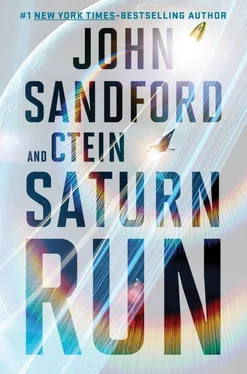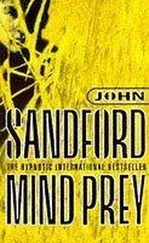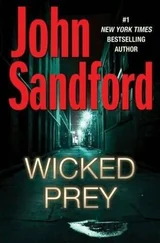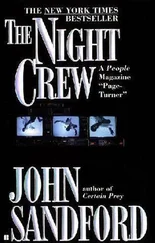Imani Stuyvesant, the exobiologist, waved a stylus. Fang-Castro nodded at her. “Are you sure? Maybe that is the wavelengths they see best. Or maybe they don’t even see the patterns the same way we do. Honeybees and birds see flowers a lot differently than we do.”
Clover smiled and tapped his fingertips together. “If you were talking about human equivalents, Imani, you could be right. But aliens, I’d say it’s pretty much guaranteed that they won’t see exactly the way we do. There are all kinds of animals on Earth that don’t see exactly the way we do. What would be the odds that the alien sensory apparatus, their eyes, would respond anything like ours? The astronomers and physicists started taking measurements like mad when it began”—Clover nodded companionably toward Bob Hannegan—“and all they saw was visible light. No other kinds of radiation. It was tailor-made for our eyes. The light show was purely for our benefit.
“So I just gotta figure, if they know that much about our physiology, they have some idea of how we respond to stimulus. The word that came to mind when I saw that display? Pretty. It was a sparkly, colorful, enticing bit of eye candy. It was presented to us the way we’d hang a shiny bauble on a string and hold it up before a baby, just to get the kid to reach out for it. You really think that was coincidence? Or miscommunication?”
Clover continued: “Remember, they could have been looking at our TV shows for a century. Beings who could build these artifacts and travel between stars almost certainly have some sense of curiosity, or self-preservation. If they could see our TV signals, they surely would have at least looked at them. Any analysis of our TV signals would tell them a lot about us: not just the culture, but our level of tech and everything else. Everything we do winds up on TV.”
Martinez raised a stylus: “What if it’s a deliberate trap?”
Clover shrugged. “Could be, but why go to the trouble? They can build starships that use antimatter for fuel. If they wanted to smack us upside the head, it’s not like there’s much preventing them from doing so. Why play games? It’s like the question of why they didn’t accelerate an asteroid into the earth, to wipe us off the face of the planet. They could, but they haven’t. That suggests they don’t want to.”
Fang-Castro pulled the argument back in. “If the aliens are intentionally deceiving us, I don’t think there’s anything we can do about it. That’s the bottom line. So we can sit out here and dither, or we can go in. We keep watching and analyzing, of course, but we’re not going to turn around and head home.” She allowed herself to show a bit of a smile. “So, I agree with John that we’ve received an invitation to reach out. We are going to reach. I won’t risk ship-critical personnel in the first team we send to the primary. Unless anyone has a relevant objection, I will assign Captain Barnes to command the first contact team. He has combat command experience and is also heavily trained in combat trauma medicine. His second will be Lieutenant Emwiller, for the same reasons. Bob Hannegan and Imani Stuyvesant will cover physics and exobiology, John Clover will see to the cultural issues, Sandy Darlington to make the record. Ms. Fiorella will probably try to assassinate me for not including her in the trip, but I’m afraid she’ll have to wait. Sandy, your first duty will be documentary, but if you should have a moment to make some vid that Ms. Fiorella can use, I’m sure she will appreciate it.”
“I will keep those priorities in mind,” Sandy said.
“Good. Do that.” Fang-Castro turned to Martinez and said, “Joe, I’m sorry, but you’re not on this run.” His face fell. “Next to Dr. Greenberg, you are the single most vital person to keeping this ship running. If things work out as we hope, you’ll have plenty of future opportunities, but for this expedition I want you to pick one of your assistants, whoever has the most experience flying a bus.”
“Elroy would be good for it. He’s good in space and has a lot of on-the-spot creativity, and I know he’s anxious to get out there.”
“Done, then. Tell Mr. Gorey.” She looked around the room, which included several members of the contact team. “I want you all to be ready to go in six hours. Do what you need to get ready. I would suggest naps. And, Mr. Crow?”
“Yes?”
“I believe you’ll find Ms. Fiorella out in the hall. Disarm her, and send her in.”
Rested and equipped, but not fed—they were uncertain about the availability of alien restrooms and although some facilities were built into the EVA suits, nobody enjoyed using them—the exploratory team assembled in the air lock of the storage and shuttle bay. The bay could be pressurized for shuttle maintenance and other on-site activities, but normally it was left open to space.
The seven-person party, led by George Barnes, a marine captain, suited up. The short-range shuttles, designed to carry up to twelve people and convey a substantial amount of cargo, were boxy skeletal affairs, similar in size and shape to double-decker omnibuses, so, naturally, that’s what they got called.
Barnes was soft-spoken and meticulous. Sandy had always been a bit suspicious of marines during the Tri-Border fight, as they seemed willing to trade casualties for easy movement. That is, they used lighter weapons than Sandy thought reasonable. Faced with a Guapo hardpoint, they’d tend to do recon with a live patrol, then attack with backpacked munitions. The army would check it with drones of various kinds, both fliers and crawlers, and once the extent of the hardpoint was determined, the army had no qualms about calling in the air force with thousand-kilo bunker-busters, or toasting the place with a fuel-air heater.
On the other hand, good marine officers were just plain good officers, and Barnes was affable enough. Along with Sandy, Barnes taught a couple of popular physical-fitness courses.
As Barnes hand-checked the readouts on all seven suits, he took a call from Fang-Castro. “Captain Barnes, your party will be enhanced by one extra member. She’ll be there in a couple of minutes.”
“Yes, ma’am. Who is it?”
“One guess.”
Fiorella showed up two minutes later, still pissed. “I imagine you set Fang-Castro straight,” Sandy joked on a private channel.
Fiorella bared her teeth.
Sandy said, “Seriously, did you pee before you left? You have a bladder the size of a thimble.”
“Yes. I peed. Now shut the fuck up.”
“Keep your teeth off your lip—you won’t be able—”
“Shut up.”
“I gotta tell you one more thing, before you tell me to shut up again.”
“Tell me.”
“I brought the mini-Red with a Post-it pad. You can stick it to the bus rail and focus it on your face as we go out, and talk to it on a side channel. When we get back, we can intercut your commentary with the documentary photos.”
“Sandy… but wait. You knew I was coming?”
“No, but I’ve been exposed to your powers of persuasion,” Sandy said. “I suspected I might be seeing you.”
“Sometimes I think you’re brighter than I give you credit for,” Fiorella said. Pregnant pause. “But only sometimes.”
____
The Nixon ’s buses weren’t pressurized. The upper deck was equipped with seats and harnesses and umbilical connectors for space suits that provided life support, power, and communications. The suits were comfortable; they’d been designed to be lived in for up to thirty-six hours. They’d support a human being for longer than that, but things would start to get ripe. Food, water, waste elimination, air recirculation, were provided for. A built-in sponge bath, not so much.
Читать дальше








